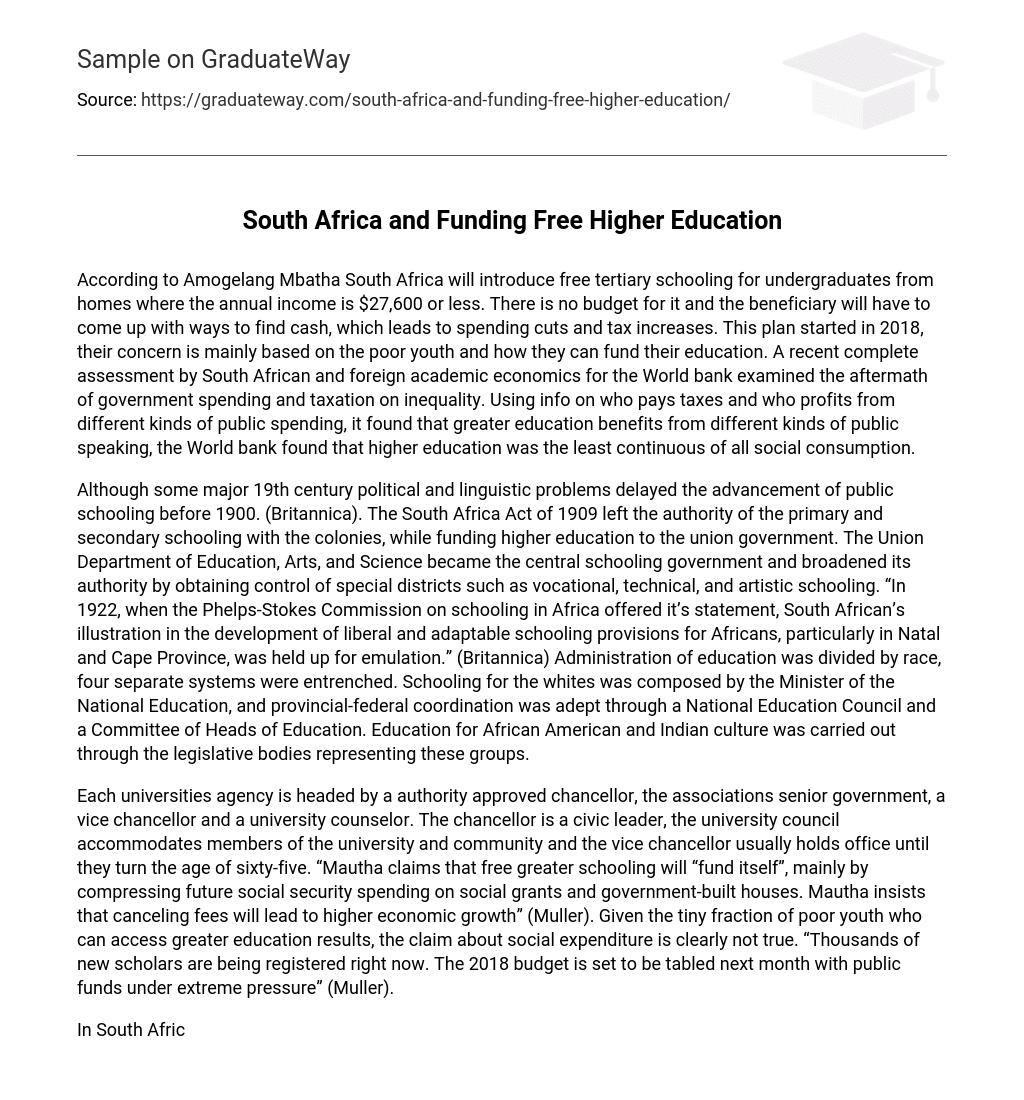According to Amogelang Mbatha South Africa will introduce free tertiary schooling for undergraduates from homes where the annual income is $27,600 or less. There is no budget for it and the beneficiary will have to come up with ways to find cash, which leads to spending cuts and tax increases. This plan started in 2018, their concern is mainly based on the poor youth and how they can fund their education. A recent complete assessment by South African and foreign academic economics for the World bank examined the aftermath of government spending and taxation on inequality. Using info on who pays taxes and who profits from different kinds of public spending, it found that greater education benefits from different kinds of public speaking, the World bank found that higher education was the least continuous of all social consumption.
Although some major 19th century political and linguistic problems delayed the advancement of public schooling before 1900. (Britannica). The South Africa Act of 1909 left the authority of the primary and secondary schooling with the colonies, while funding higher education to the union government. The Union Department of Education, Arts, and Science became the central schooling government and broadened its authority by obtaining control of special districts such as vocational, technical, and artistic schooling. “In 1922, when the Phelps-Stokes Commission on schooling in Africa offered it’s statement, South African’s illustration in the development of liberal and adaptable schooling provisions for Africans, particularly in Natal and Cape Province, was held up for emulation.” (Britannica) Administration of education was divided by race, four separate systems were entrenched. Schooling for the whites was composed by the Minister of the National Education, and provincial-federal coordination was adept through a National Education Council and a Committee of Heads of Education. Education for African American and Indian culture was carried out through the legislative bodies representing these groups.
Each universities agency is headed by a authority approved chancellor, the associations senior government, a vice chancellor and a university counselor. The chancellor is a civic leader, the university council accommodates members of the university and community and the vice chancellor usually holds office until they turn the age of sixty-five. “Mautha claims that free greater schooling will “fund itself”, mainly by compressing future social security spending on social grants and government-built houses. Mautha insists that canceling fees will lead to higher economic growth” (Muller). Given the tiny fraction of poor youth who can access greater education results, the claim about social expenditure is clearly not true. “Thousands of new scholars are being registered right now. The 2018 budget is set to be tabled next month with public funds under extreme pressure” (Muller).
In South Africa, students are upset over schooling costs administrators have been punched and taken and held captive, buildings are set on fire, police are called in for rioting, the greater schooling minister burned in effigy, school campuses shut down or placed under curfew and exams delayed. Scholars have been shot with stun grenades and rubber bullets. “Adam Habib, the president of Witwatersrand, warns that, at a time when a quality university education is both universally essential for many jobs and not affordable to a whole lot of people, this may be a harbinger of what’s ahead in other countries” (Marcus). “If you’re trying to give up hope where maybe there isn’t hope, you’re going to overload the universities while not funding them enough money,” Muller said. Low income scholars in both countries often attend much worse primary and secondary schools that don’t provide the support that students need and fewer mentors for them.
One of the biggest issues is not the issue of fees but the issues of poor access and greater dropout rates for those who entered the system. South African government and authorities have the treasury do the necessary financial resources available, but abolishing all the fees in an not so equal society may not be a good solution. Many universities were forced to take away academic activities, the riots caused hundreds of millions of random damages, and led to horribly violent confrontation between scholars, police, and security guards, as well as arrests of many scholars. The student protests area major manifestation of shortcoming and failures of the transformation of South Africa’s higher education. They have also emerged an illustration of an expanding frustration with the state of the South Africa. Money is another major challenge for South Africa. Students cover through tuition fees part of the costs of school. These fees may be relatively lower compared to European or North American fees, but for the majority of South African students they are high and is far beyond the reach of an average South African household income.





